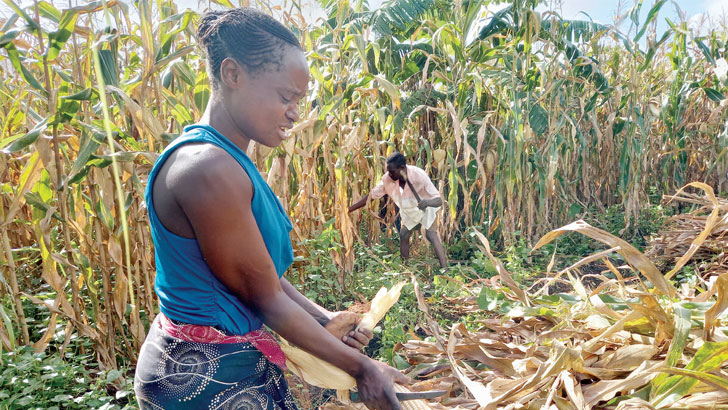Experts defend Produce prices
Experts in the agricultural sector have backed the minimum farm gate prices for produce, including the staple grain maize, saying most farmers benefitted from the Affordable Inputs Programme (AIP); hence incurred less production costs.
But the experts have called for strict enforcement and adherence to the set prices, noting that in previous seasons, farmers got raw deals as some unscrupulous buyers capitalised on their vulnerability and bought the produce at below the recommended prices.
They were reacting to new minimum farm gate prices for the 2020/21 agricultural season which have pegged maize at K150 per kilogramme (kg) from K200 per kg during the previous season.
In a written response yesterday, agricultural policy and development expert Tamani Nkhono-Mvula said the current minimum price for maize was still fair considering that much of the crop was grown under the AIP, meaning cost of production was low.

“All the maize growers who are smallholder farmers had access to the subsidy. You may note that last year the minimum price was much higher, but that is understandable as last year very few benefitted from the subsidy,” he said.
Nkhono-Mvula said with the set K150 per kg, farmers can still break even and make profit. He observed that the prices announced were minimum offers; hence, farmers can negotiate to sell at higher prices.
But he said enforcement is key while taking into consideration that the country adopted a liberal market system.
On her part, Civil Society Agriculture Network (CisaNet) executive director Pamela Kuwali said with an expected surplus in maize output, the maize minimum farm gate price is reasonable such that farmers would make a profit.
She said: “The most important thing is that the mechanisms put in place to ensure the prices are adhered to and enforced. Secondly, Admarc must enter the market to ensure access to market for farmers.”
Farmers Union of Malawi (FUM) president Frighton Njolomole asked for more time before responding, saying he needed to consult first.
Minister of Agriculture Lobin Lowe has since warned vendors against exploiting farmers, saying his ministry alongside relevant stakeholders will monitor and enforce compliance.
In a statement, the minister said buyers should submit monthly returns of quantities purchased to licensing offices in district councils and programme managers in all the Agricultural Development Divisions (ADDs) as well as the director of crop development at the ministry.
Lowe said: “It is the wish of this government to see farmers getting rewards for their hard work and this will only be achieved by a comprehensive enforcement of these minimum farm gate prices.”
While urging farmers not to rush in selling their produce to unscrupulous traders, he said his ministry will direct State produce trader Agricultural Development and Marketing Corporation (Admarc) to approach the farmers once they notify the ministry on their intentions to sell.
Meanwhile, the Malawi Police Service also said it will be monitoring all players in the agricultural sector to ensure compliance.
In a statement, National Police spokesperson James Kadadzera warned that non-compliance will lead to prosecution.
During the 2017/18 season, maize was set at K170 per kg while in the 2018/19 season it was
pegged at K180 per kg. In the 2019/20 season, it was set at K200 per kg before the current K150 per kg.
Last week, Lowe presented a report to President Lazarus Chakwera which projected maize surplus harvest, lending credence to the AIP which some critics questioned at inception.
According to the new farm gate prices, polished rice will be selling at K600 per kg, unpolished rice at K250 per kg, pure beans at K510 per kg from K450 per kg, mixed beans at K410 per kg, shelled groundnuts at K480 per kg, unshelled groundnuts at K330 per kg, pigeon peas at K240 per kg while cotton at K320 per kg, just to mention a few.
Through the Ministry of Agriculture, government sets minimum farm gate prices for major agriculture commodities such as beans, cassava, groundnuts, maize and rice at the onset of each season to regulate prices and protect farmers from exploitation by traders.
However, in November last year, an assessment by the Agriculture Policy Research Africa (Apra) faulted government for its failure to enforce the minimum farm gate prices, leading to traders not abiding by them and in turn leading to farmers incurring losses.
In its August 2020 paper titled ‘Can a maize price band work in Malawi?’ International Food Policy Research Institute (Ifpri) also said government intervention has failed to lift estimated maize farm gate prices.





